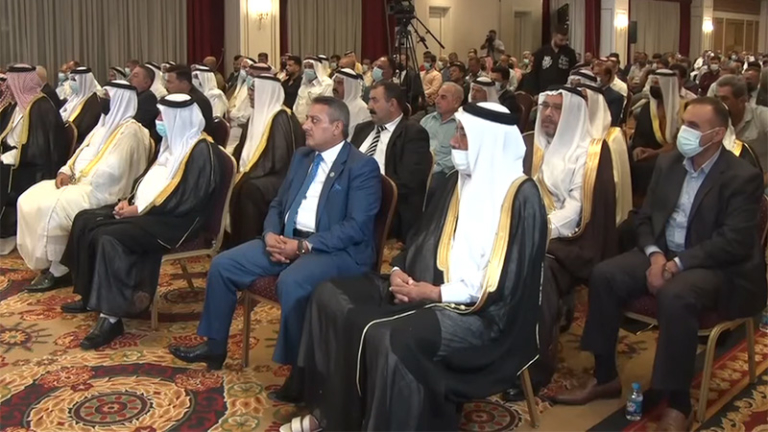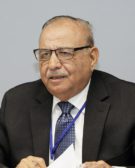
On September 24th, some 300 Iraqi tribal and political leaders, mostly from Iraq’s six Sunni-majority governorates, met at a conference in Erbil, capital of the Kurdish region in northern Iraq, and called for a federal state in which the Sunnis would have a region like that for the Kurds. Their justification for the proposal was to avoid or minimize infringement by Shia militias that have for years intimidated them while operating under the guise of the Popular Mobilization Forces that helped fight the so-called Islamic State. But the surprise came when the spokesperson for the conference, Wisam al-Hardan, publicly called for full normalization with Israel and for joining the Abraham Accords between Israel, on one side, and the United Arab Emirates, Bahrain, Morocco, and Sudan, on the other. He also called for restitution for Jews of Iraqi origin who had emigrated to Israel decades ago.
This declaration constituted a shock to the Iraqi body politic and society. Iraq today is experiencing some serious challenges that defy a resolution such as vertical social divisions, economic problems, and political discord ahead of what was perceived by some observers as very consequential parliamentary elections. It is hard to imagine that the country is ready and equipped to take on such a challenging mission as normalizing with Israel. What was especially unsettling was the nagging questions of whether the leaders who participated in the conference truly represent Iraq’s Sunnis, whether Sunni public opinion wants to normalize with Israel, and whether there were behind-the-scenes influencers who truly wanted the country to join the Abraham Accords.
Iraq has rejected any relations with Israel since the latter’s establishment in 1948 and has participated in every war it fought with Arabs.
Needless to say, Iraq has rejected any relations with Israel since the latter’s establishment in 1948 and has participated in every war it fought with Arabs. In 1981, Israel destroyed Iraq’s nuclear research reactor, Osirak, as Iraq was fighting a war with Iran. In the 1991 Gulf War to liberate Kuwait from Iraqi occupation, Iraq attacked Israel with ballistic missiles that caused some significant physical damage and injuries. The American invasion and occupation of Iraq in 2003 was an occasion for breaking the barrier with Israel; but control of Iraqi politics by pro-Iran factions made that hard to achieve. Besides, public opinion in Iraq overwhelmingly rejects relations with Israel; in a 2019-2020 survey by the Arab Center for Research and Policy Studies, a full 90 percent of Iraqis said that they oppose diplomatic recognition of Israel.
This obviously flies in the face of what the Trump Administration succeeded in doing regarding normalizing relations between Israel and other Arab countries and signing the Abraham Accords. Today, the Biden Administration appears to want to continue, although less enthusiastically than its predecessor, with this process, claiming that it will help to bring peace to the Middle East. US Secretary of State Antony Blinken recently attended the one-year anniversary of the accords and spoke of benefits that “continue to grow” from them. (He also is slated to hold a trilateral meeting on October 13 with the Israeli and Emirati foreign ministers in Washington, which would be the first such meeting between the three.) Nevertheless, and perhaps cognizant of the impact of Iraqi public anger at the conference on US anti-terrorism operations in the country, the spokesperson for Operation Inherent Resolve was quick to distance the coalition from it and from the participants.
The Erbil Conference for Peace and Recovery
The conference was convened under a veil of secrecy and confusion. Its planners must have understood that it was going to raise many objections in Iraq. Instead, they announced that the meeting was about establishing a federated state in Iraq where the Sunni governorates would be one region and would have authority over their own territories. The federal choice has been boosted by public opinion in these areas which over the last few years was impacted by the intimidation by Iran-friendly militias that participated in defeating the Islamic State and by threats of potential demographic changes resulting from feared resettlement of Pakistani and Afghan Shia families in their areas.
Many of the 300 personalities in attendance came to discuss how they can help to implement a federal structure in the country.
Indeed, many of the 300 personalities in attendance came to discuss how they can help to implement a federal structure in the country. After all, they reasoned, the Kurds were able to establish the Kurdistan Regional Government (KRG) following the adoption of the 2005 constitution after the American invasion in 2003. It is thus natural that the participants in the Erbil conference were surprised when Chemi Peres, the son of the late Israeli President Shimon Peres, took the podium to address the participants. They obviously could have withdrawn when they knew the real intent from the meeting, but they didn’t. This led to threats of arrest or death. Some of them later expressed their regret and said that they were tricked into attending the conference.
It is obvious that local and international actors were involved in setting this conference up. One such actor is a little-known organization based in New York, the Center for Peace Communications (CPC), which was established by Joseph Braude and whose Board of Directors includes Dennis Ross, a Distinguished Fellow at the Washington Institute for Near East Policy (WINEP), a pro-Israel research center. Another is the pro-Israel Foundation for Defense of Democracies (FDD) that is very close to the America-Israel Public Affairs Committee, Israel’s lobbying organization in the United States. WINEP, FDD, the Anti-Defamation League, and former Secretary of State Mike Pompeo also urged the Biden Administration to publicly back the conference.
Ross authored an article in Foreign Policy on September 30 (that was cross-posted on WINEP’s website) extolling the “remarkable event” in Erbil and highlighting the fact that most of the attendees were Sunni Muslims, in the process heightening already tense relations between Iraq’s largest sects and casting all Sunnis as advocates of relations with Israel. He also highlighted the participation of Wissan al-Hardan, a former Sahwa (Awakening) leader, General Amer al-Juburi, and Sahar al-Taei, who was until recently an official in Iraq’s Ministry of Culture. The latter was dismissed from her position shortly after appearing in the conference and calling for Iraq’s joining the Abraham Accords.
Wissam al-Hardan
The participation of Wissam Ibrahim al-Hardan in the conference was both surprising and revealing. Al-Hardan was one of the leading military commanders of Sunni tribal fighters who defeated al-Qaeda in al-Anbar governorate in Iraq. He worked with General David Petraeus, commander of US forces in Iraq. He was known for his association with Arab nationalists in the 1960s and 1970s and supported Palestinian armed struggle. He also authored two books on his Sahwa experience. Following the conference, his extended family issued a statement dissociating itself from him and expressing its adherence and support for Palestinians rights in Palestine.
Hardan’s later claim that he was duped into attending the conference is belied by the appearance of an article under his name in the Wall Street Journal that was timed for the day of the conference.
Hardan’s later claim that he was duped into attending the conference is belied by the appearance of an article under his name in the Wall Street Journal that was timed for the day of the conference. That the op-ed may not have been his work is by now obvious; but that did not exonerate him from the responsibility of reading a statement at the conference in which he repeated the same ideas, only to recant them immediately after. This reality puts what can be called “a comedy of errors” in sharp relief: pro-Israel organizations and personalities in the United States used disaffected Iraqis with no political power to push for relations with Israel. What is even more damning is that the organizers really thought that they could execute this harebrained idea under the noses of Iraqi pro-Iran factions and militias that are in total control of political space in Baghdad.
It is important at this juncture to mention that normalizing with Israel was earlier undertaken by another Iraqi political figure. Mithal al-Alusi has not been shy about his admiration for Israel. He was a member of the Iraqi National Congress that was headed by the late Ahmed al-Chalabi, one of the enthusiasts for the American invasion of 2003 and head of the De-Baathification project that followed it. Al-Alusi visited Israel twice, in 2004 and 2008, and lost his two sons in 2005 by attackers who mistakenly thought he was in the vehicle carrying them.
The Response of the Iraqi and Kurdistan Governments
The government of Prime Minister Mustafa Al-Kadhimi quickly condemned the conference while Kurdish officials pretended not to know about it. Iraqi President Barham Salih, who is Kurdish, also rejected it. Iraq’s Supreme Judicial Council issued arrest warrants for Hardan and Taie as well as al-Alusi, although the latter did not participate in the meeting. The Ministry of Culture later dismissed Taie from her position; more importantly, the minister was adamant that she was not deputized and did not speak in the name of his agency. As for the KRG government, it is simply incredulous that it would not know about such a consequential and large conference. Needless to say, Israel has very close relations with the KRG and supported that region’s attempt to secede from Iraq in 2017.
What can be gleaned since the meeting is that it benefited the Iran-friendly militias that used it for electoral purposes and to improve their standing in Iraqi politics.
What can be gleaned since the meeting is that it benefited the Iran-friendly militias that used it for electoral purposes and to improve their standing in Iraqi politics. Importantly, it gave them the opportunity to appear more nationalistic on the question of Israel and Palestine, although their loyalties may lie outside of Iraq’s borders. Additionally, the meeting may have allowed them to escape the repercussions of a bad record on the economy since they are mired in corruption and incompetence.
But whatever the attempts of those who either were cognizant of what they were doing in Erbil, were duped into attending the conference, or later recanted, Iraqis will continue to reject normalizing relations with Israel overwhelmingly. To them, Palestine remains a widely popular cause and the Palestinian people deserve their usurped rights restored.

